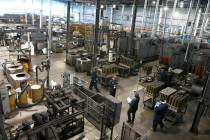Little reason for optimism seen in Beige Book report
Little optimism was seen in a report Wednesday for the region that includes Las Vegas and Nevada except that prices for goods other than energy and food are stable.
"It's pretty much more of the same except a little worse," professor Lee McPheters, director of the JPMorgan Chase Economic Outlook Center at Arizona State University, said about the Federal Reserve Board's latest Beige Book report.
The Beige Book, which provides an overview of economic conditions in 12 areas of the United States, listed a series of problems in the San Francisco district, which includes Nevada:
• "Demand for new and existing homes remained exceptionally weak, fueling further price declines, especially in parts of California, Arizona and Nevada that also have seen sharp increases in home foreclosures."
• "Some reports indicated that builders are using a variety of incentives, such as covering buyers' closing costs, to whittle away at their unsold inventories."
• "Credit quality deteriorated a bit further, mainly for residential real estate and construction loans, with community banks feeling the greatest impact."
• Demand for new and used autos remains weak, the government agency said. "Dealers have grown reluctant to accept trucks and (sport utility vehicles) as trade-ins on purchases, due to a reported 'collapse' in the wholesale market for these vehicles."
The report also said that "tourist activity was flat to down in general."
"Airlines struggled with reduced travel demand and higher fuel costs, and contacts noted plans for further cutbacks in flights," the Beige Book said.
Jeff Thredgold, economist for Nevada State Bank, agreed that the Beige Book reported "more of the same," but he saw a few encouraging comments. The report notes there is strong demand for agricultural and natural resources, including minerals such as gold mined in Nevada.
"Nevada companies that are making products and selling around the world are doing pretty well," Thredgold said. Those include manufacturers of computers and electronics.
McPheters noted that the weak dollar makes the region attractive to foreign visitors
Yet, McPheters said Nevada, Arizona and Florida, once leading growth states, are ranked in the bottom, "rubbing shoulders with Michigan" for poor job growth.
"These three states are among the weakest states in the country probably in the pace of job losses," he said.
Once Nevada and Arizona acted like vacuum cleaners, drawing people looking for jobs. But those people are now probably moving to energy-rich states like Wyoming, Colorado and Texas where economies are strong, he said.
"I think we are going to see unemployment continue to go up because it's a lagging indicator," McPheters said. "The consumer is going to have a lot to worry about."
In addition, the national economic slump makes it hard for people to sell their homes so that they can move and retire in states like Nevada and Arizona, he said.
The Fed, meanwhile, is struggling to keep inflation under control, which often is done by increasing interest rates. But high interest rates typically are a drag on the economy, which already is weak, Thredgold said.
The bank economist estimates odds are 90 percent against the Fed changing interest rates at its Aug. 5 meeting. Thredgold expects the Fed to start raising rates slowly in small increments toward the end of the year.
Contact reporter John G. Edwards at jedwards@reviewjournal.com or 702-383-0420.























